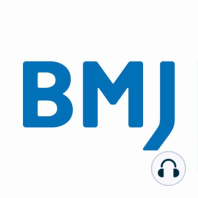19 min listen

Primary Cytoreduction for Advanced Endometrial Cancer with Rebecca Previs and Benjamin Albright
FromIJGC Podcast
Primary Cytoreduction for Advanced Endometrial Cancer with Rebecca Previs and Benjamin Albright
FromIJGC Podcast
ratings:
Length:
42 minutes
Released:
Aug 9, 2021
Format:
Podcast episode
Description
In this episode of the IJGC podcast, Editor-in-Chief Dr. Pedro Ramirez, is joined by Drs. Rebecca Previs and Benjamin Albright to discuss primary cytoreduction for advanced endometrial cancer. Dr. Rebecca Previs is an assistant professor within the Division of Gynecologic Oncology and the Department of Obstetrics & Gynecologic at Duke University Medical Center, Duke Cancer Institute in Durham, NC. Her translational research interests include understanding how the immune microenvironment and molecular characterization of gynecologic cancers influences disease biology and treatment outcomes. Outside of medicine, she enjoys spending time with her menagerie of pets, gardening, hiking, harvesting honey from her bee hives, and playing the piano. Dr. Ben Albright is a second-year fellow within the Division of Gynecologic Oncology and the Department of Obstetrics & Gynecologic at Duke University Medical Center, Duke Cancer Institute in Durham, NC. His research interests include health policy and economics, health services research, systematic review, and cost-effectiveness analysis. Outside of medicine, he enjoys trail running, tennis, hiking with his wife and two big dogs, and University of Kentucky basketball.
@BeccaPrevisMD / @BenAlbrightMD / @dukeobgyn / @DukeCancer
Highlights
1. The objective of our study was (1) to assess the frequency of reported proportions of maximal (R0, no gross residual disease) and optimal (<1 cm or <2 cm residual disease cytoreduction in patients with advanced stage endometrial cancer, and (2) to describe the impact of achieving these levels of surgical debulking on progression free survival and overall survival.
2. Our analysis included a total of 34 studies, which included 2,920 total patients with stage III or IV endometrial cancer undergoing primary cytoreductive surgery. Overall, 52% of patients were reduced to no gross residual disease, while 75% reached optimal debulking with <1 cm of residual disease.
3. Submaximal and suboptimal cytoreduction to be significantly associated with worse progression-free survival with a hazard ratio of 2.2 and 2.6, respectively. Studies that included Stage III patients had higher rates of maximal cytoreduction, 69.8% versus 41.4% for studies of Stage IV patients alone. While stage was clearly important, histology was not associated with the extent of cytoreduction, with generally similar rates across endometrial, serous or clear cell, and carcinosarcoma histologies.
4. Neoadjuvant chemotherapy for women with advanced stage uterine cancer is increasing, although prospective data for this approach are limited.
5. Women with advanced stage endometrial cancer should be encouraged to enroll on clinical trials when available.
@BeccaPrevisMD / @BenAlbrightMD / @dukeobgyn / @DukeCancer
Highlights
1. The objective of our study was (1) to assess the frequency of reported proportions of maximal (R0, no gross residual disease) and optimal (<1 cm or <2 cm residual disease cytoreduction in patients with advanced stage endometrial cancer, and (2) to describe the impact of achieving these levels of surgical debulking on progression free survival and overall survival.
2. Our analysis included a total of 34 studies, which included 2,920 total patients with stage III or IV endometrial cancer undergoing primary cytoreductive surgery. Overall, 52% of patients were reduced to no gross residual disease, while 75% reached optimal debulking with <1 cm of residual disease.
3. Submaximal and suboptimal cytoreduction to be significantly associated with worse progression-free survival with a hazard ratio of 2.2 and 2.6, respectively. Studies that included Stage III patients had higher rates of maximal cytoreduction, 69.8% versus 41.4% for studies of Stage IV patients alone. While stage was clearly important, histology was not associated with the extent of cytoreduction, with generally similar rates across endometrial, serous or clear cell, and carcinosarcoma histologies.
4. Neoadjuvant chemotherapy for women with advanced stage uterine cancer is increasing, although prospective data for this approach are limited.
5. Women with advanced stage endometrial cancer should be encouraged to enroll on clinical trials when available.
Released:
Aug 9, 2021
Format:
Podcast episode
Titles in the series (100)
Clinical Implications of Sentinel Lymph Node Mapping in Endometrial Cancer with Andrea Mariani: In this episode of the IJGC podcast, Editor-in-Ch… by IJGC Podcast